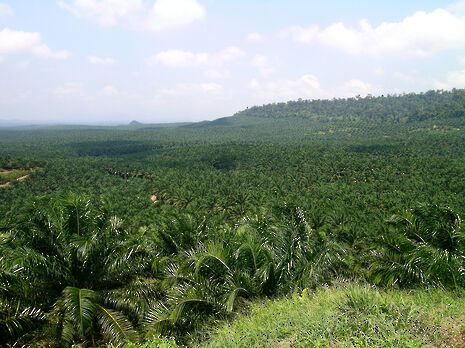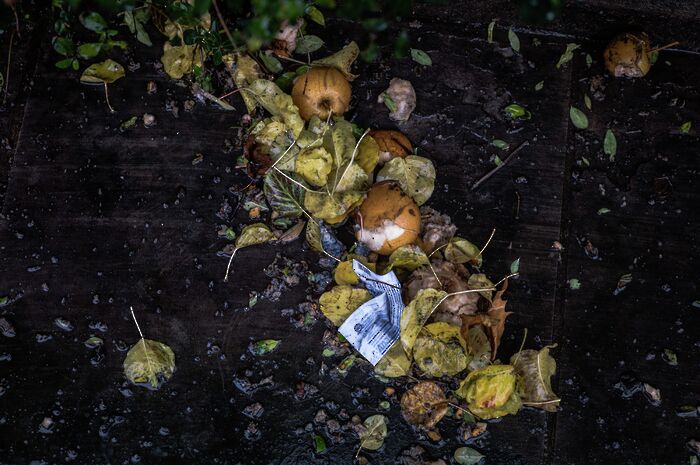Palm oil, the other oil crisis
Belinda Ng talks to Cambridge academic and member of the Environmental Economy and Policy Research Group Dr Rosemary Ostfeld about what we can do to ensure we are eating sustainably

The controversy surrounding palm oil is deemed the ‘other’ oil crisis; a quieter, but just as destructive, practice compared with the headlines about the fossil fuel industry. Found widely in our processed snacks, shampoo, ice-cream, bread and more, palm oil is an edible vegetable oil derived from the fruit of the African palm oil tree. Although cheap and versatile, its widespread plantations in Southeast Asia and South America is contributing to deforestation, loss of biodiversity, and the release of potent greenhouse gases.
But are there ways for us to transition towards sustainable consumption of palm oil? Dr Rosemary Ostfeld is a member of the Environmental Economy and Policy Research Group, and part of the Department of Land Economy here at the University of Cambridge. Her insights into environmental sustainability in the palm oil industry offer new hope for the battle against the rapid loss of our planet’s tropical rainforests, a battle which, currently, we seem to be losing.
While palm oil has a reputation of just being a villain, the common misconception to just ban it is wrong, Dr Ostfeld says. The problem with the palm oil supply chain is not really to do with the nature of palm oil itself. According to Dr Ostfeld, there are many benefits of palm oil, namely the fact that it is more efficient to produce and requires fewer resources than other types of vegetable oil. Instead, its controversial nature is locational: palm oil is harvested in areas of pristine tropical rainforest, particularly in Indonesia and Malaysia. She also adds that “like many commodities, it is very difficult to trace the supply chain and know exactly which plantation the palm oil has come from.”
“Public awareness campaigns have been getting palm oil on the map as a hot issue”
Here is where the Roundtable on Sustainable Palm Oil (RSPO) comes in as a promising solution. This non-profit organisation was founded in 2004 by the World Wildlife Fund and other key stakeholders throughout the supply chain. "By making sure products on supermarket shelves contain RSPO identity preserved palm oil the supply chain options can be traced towards the plantation level." Dr Ostfeld explains. Even for non-identity preserved palm oil supply chain options, the certification still involves an independent body coming in to assess and track palm oil plantations according to designated criteria that is renewed regularly. Examples of criterion include respecting the human rights, minimising erosion and soil degradation, and avoiding use of fire to prepare land, which is particularly important in the Southeast Asian context where land is often cleared by human-induced fires.
Most recently, the RSPO body placed a ban on deforestation, which Dr Ostfeld says is a major step-up by the RSPO body in the fight to save the rainforests. Violation of these principles will result in suspension of the RSPO membership. Importantly, This “identity-preserved” palm oil is helpful because the system can be used alongside other tools, such as Global Forest Watch, that can track deforestation.
The reason why the RSPO works, according to Dr Ostfeld, is that the supply chain becomes much more transparent and traceable. “It is a really strong supply chain model because you can trace it if the grower is doing something wrong,” she says.
“Customers cannot be relied upon to make sustainable choices”
She also adds that “[the RSPO] has made it possible for all these different stakeholders, such as growers, processors, traders, consumer goods manufacturers, and NGOs, to collaboratively come up with solutions”. She believes there is wider potential for RSPO certification to be applied to other products with a large environmental footprint, such as soy or beef. This being said, she also recognises the challenges and limitations of certification: “It’s a step in the right direction by providing extra checkpoints, but there are many social and political issues and many commodities that need to be addressed.”
Further down the palm oil supply chain, we, the consumers of palm oil, contribute to the problem as well. Dr Ostfeld’s research on customer awareness of palm oil and its impact show that ecolabel awareness doesn’t necessarily translate to sustainable purchases. She compares the RSPO certification with fair trade to show that whilst 82% of people recognise and know about the fair-trade label, only 29% of those consistently purchase fair trade products. “This shows that customers cannot be relied upon to make sustainable choices,” Dr Ostfeld says. She argues that if sustainable change is to occur, governments need to take action to require consumer goods retailers to purchase only 100% certified palm oil that is identity preserved. “A degree of flexibility will be needed by allowing different supply chain options towards meeting this target of 100% certified palm oil,” Dr Ostfeld suggests.
Undoubtedly, it is easy to feel like this is a problem for governments and large organisations to handle. But Dr Ostfeld says there are many things we can do as individuals that will make a big impact. Firstly, we can push for retailers and consumer goods manufacturers to be upfront and transparent about the palm oil they are using in their products. “Public awareness campaigns have been getting palm oil on the map as a hot issue”, Dr Ostfeld says. But making a difference does not just include activism. The key thing for us remains about “peeling back the label” by being a conscious consumer.
Palm oil is most common in processed foods, such as cookies and instant noodles, so minimising consumption will help. WWF also has a variety of great resources ranking brands based on their sustainable palm oil commitments, as well as how to recognise the different ways palm oil is named on products.
Increasingly, there are also many online resources that provide information about the palm oil supply chain for people like us to understand where our products are coming from. Knowledge is power, and Dr Ostfeld is hopeful that through collaboration between consumers, retailers, and governments, positive changes can be made. “It’s so important to try to learn more about these issues and not be afraid to make lifestyle changes to become more sustainable.”
 Features / How sweet is the en-suite deal?13 January 2026
Features / How sweet is the en-suite deal?13 January 2026 Comment / Will the town and gown divide ever truly be resolved?12 January 2026
Comment / Will the town and gown divide ever truly be resolved?12 January 2026 News / 20 vet organisations sign letter backing Cam vet course13 January 2026
News / 20 vet organisations sign letter backing Cam vet course13 January 2026 Arts / Fact-checking R.F. Kuang’s Katabasis13 January 2026
Arts / Fact-checking R.F. Kuang’s Katabasis13 January 2026 Music / Inside Radiohead’s circle13 January 2026
Music / Inside Radiohead’s circle13 January 2026










